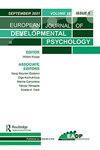Self-isolation practices and perceived social support from friends: The impact on adolescents’ mental health
IF 1.9
4区 心理学
Q3 PSYCHOLOGY, DEVELOPMENTAL
European Journal of Developmental Psychology
Pub Date : 2022-11-14
DOI:10.1080/17405629.2022.2146090
引用次数: 1
Abstract
ABSTRACT The purpose of the present study was to investigate the moderating effect of perceived social support from friends in the associations between self-isolation practices during the COVID-19 pandemic and adolescents’ mental health (i.e., depression, subjective health complaints, self-harm), measured six months later (Time 2). Participants were 1,567 7th and 8th graders (51% female; 51% white; M age = 13.67) from the United States. They completed questionnaires on perceived social support from friends, depression, subjective health complaints, and self-harm at Time 1, and self-isolation practices during COVID-19, depression, subjective health complaints, and self-harm at Time 2. The findings revealed that self-isolation practices during COVID-19 was related positively to Time 1 perceived social support from friends, and negatively to Time 2 depression, subjective health complaints, and self-harm, while accounting for Time 1 mental health outcomes. Higher perceived social support from friends at Time 1 buffered against the negative impacts on adolescents’ mental health outcomes at Time 2 when they practiced greater self-isolation during COVID-19, while lower perceived social support at Time 1 had the opposite effects on Time 2 mental health outcomes.自我隔离行为与来自朋友的感知社会支持:对青少年心理健康的影响
本研究的目的是调查来自朋友的感知社会支持在COVID-19大流行期间自我隔离行为与青少年心理健康(即抑郁、主观健康投诉、自残)之间的关联中的调节作用,这些行为是在6个月后(时间2)测量的。参与者为1567名七年级和八年级学生(51%为女性;51%的白人;年龄= 13.67岁),来自美国。他们完成了关于时间1时来自朋友的感知社会支持、抑郁、主观健康抱怨和自残的问卷,以及在COVID-19、抑郁、主观健康抱怨和时间2时自我隔离行为的问卷。研究结果显示,COVID-19期间的自我隔离行为与时间1感知到的来自朋友的社会支持呈正相关,与时间2抑郁、主观健康抱怨和自我伤害呈负相关,同时考虑到时间1的心理健康结果。当青少年在COVID-19期间进行更多的自我隔离时,时间1中来自朋友的较高感知社会支持缓冲了时间2对青少年心理健康结果的负面影响,而时间1中较低的感知社会支持对时间2心理健康结果的影响相反。
本文章由计算机程序翻译,如有差异,请以英文原文为准。
求助全文
约1分钟内获得全文
求助全文
来源期刊

European Journal of Developmental Psychology
PSYCHOLOGY, DEVELOPMENTAL-
CiteScore
3.70
自引率
0.00%
发文量
35
 求助内容:
求助内容: 应助结果提醒方式:
应助结果提醒方式:


